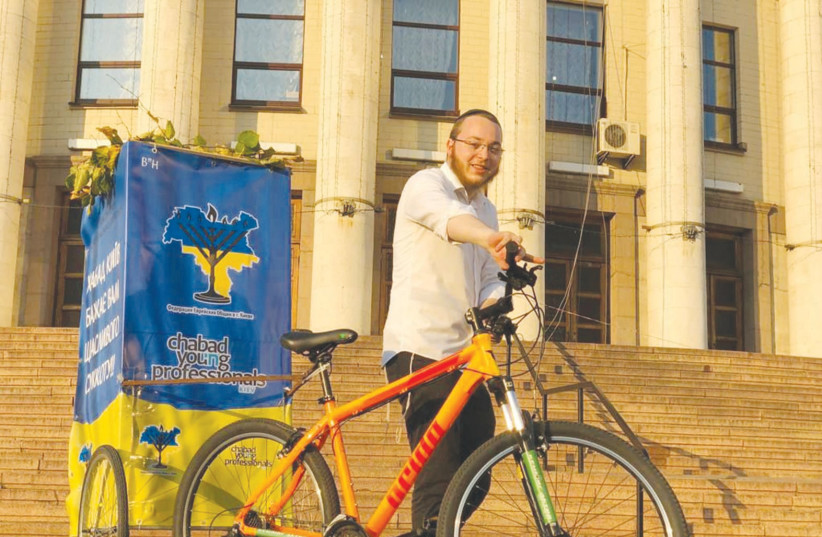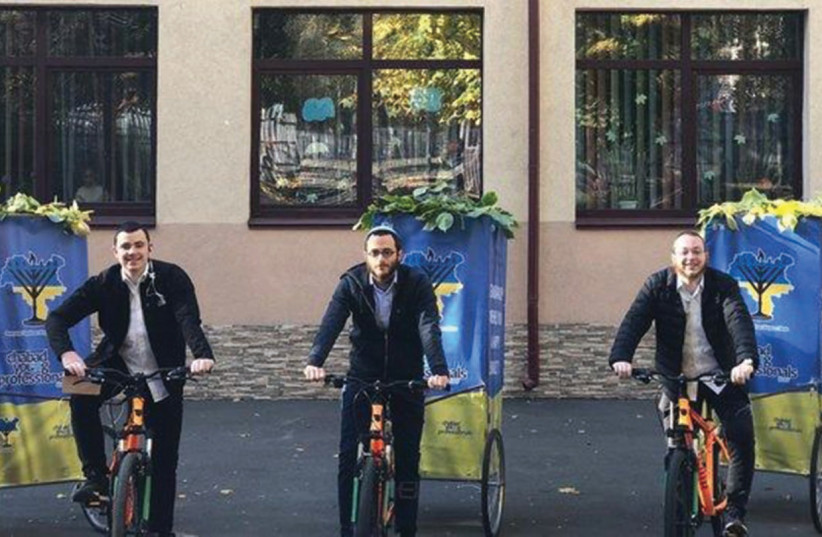This year’s Sukkot was very different for Ukraine’s Jews. At any given moment an attack could have caused a Jewish family to run to a nearby bomb shelter. The holiday of Sukkot is celebrated in temporary hut-like tents (lower-case “sukkah” singular and “sukkot” plural). In cases of risk or problematic weather, however, observant Jews are permitted to stay indoors.
Kyiv’s Chief Rabbi Jonathan Markowitz spoke to The Jerusalem Post prior to Sukkot and shared what he said were then plans for one of the more difficult holidays he ever experienced.
“Our community members usually use public sukkot that we build. It’s impossible to build sukkot on the sidewalks or in the street [as is done in Israel or in large Jewish neighborhoods in North America]. Therefore, most of the community uses the sukkot we build in a communal way.”
“Our community members usually use public sukkot that we build. It’s impossible to build sukkot on the sidewalks or in the street [as is done in Israel or in large Jewish neighborhoods in North America]. Therefore, most of the community uses the sukkot we build in a communal way.”
Kyiv Chief Rabbi Jonathan Markowitz
Markowitz, an Israeli who has been serving as emissary for the Chabad movement for many years, added, “There are also those who build sukkot on the balconies of their houses.” He shared that in years before the war, community members set up seven public sukkot in synagogues and educational institutions. This year will, unfortunately, be different.
Many members of the community have already left the country or moved to other cities in Ukraine.

“During the COVID-19 pandemic, we had to think of a creative solution to reach people who were in their homes and could not go out because of the lockdown. We then launched the ‘Uber Sukkah.’ Anyone who wanted it, called us, and a team with a sukkah on an electric bike arrived in about 15 minutes.”
Even prior to the war, Markowitz said that since the pandemic hit Ukraine, “this project has remained with us, and it is the flagship project of the community Sukkot celebrations.”
Celebrating Sukkot in Ukraine during the Russian invasion
Asked how they were expected to celebrate Sukkot in 2022, while the Russian Army might attack at any given moment, Kyiv’s rabbi began with a short explanation.
“In Judaism, Sukkot is considered as ‘the time of our happiness,’ so this year too, we will not give up and will make Sukkot the happiest we can. We will build sukkot at our synagogues and educational institutions. Even if there will be fewer participants than every year, we will try to create the special and joyful atmosphere that we have every year.
“Naturally we will also have changes,” Markowitz said sadly. “Every year we host large holiday meals and events of Simhat Beit Hashoeva [a celebration held during the intermediate days of Sukkot] that connect the Jewish businessmen with the entire Jewish community. We would usually celebrate properly. This year, because of the security regulations, we are trying not to hold very large gatherings and even those who do gather need to end it early because at 11 p.m., the curfew begins.
“We are hosting smaller holiday meals in a larger area in order to split the crowd up to as many groups as possible,” he said. “In addition, we have sent care packages with holiday meals for those who cannot make it to the synagogues and community centers. These are mainly the elderly and the needy who receive assistance from us throughout the year.”
MARKOWITZ SHARED that the Uber Sukkah project was still in question for this year.
“Those who ran this project last year are the energetic young people of the community who are now being recruited to the army or elsewhere,” he said. On the day this interview took place, Markowitz was skeptical. “Right now we don’t have this wonderful manpower that can run Uber Sukkah. In general, the security situation requires all of us to behave carefully and not attract too much attention.”
Ukraine has many areas that experience very difficult winter weather, which makes it even more difficult to regularly rely on a meal in a sukkah.
“It’s already rainy and cold in Kyiv. It’s about 10 degrees Celsius [50°F] during the day and we try to make sure that our Sukkot are pleasant and warm.”
Usually, Markowitz explained, the Federation of Jewish Communities in Ukraine sells sets of the Four Species of Sukkot, (four plants mentioned in the Torah as being relevant to the holiday). “This year it’s a more complicated story because there is no air shipping and no sea shipping, but we received the holiday supplies and the Four Species in alternative ways,” he said. “Perhaps a little less abundance is felt than every other year, but there is no shortage. The Four Species have arrived through Hungary and other European countries.”
Shlomi Peles, CEO of the Jewish Relief Network Ukraine (JRNU), Chabad’s emergency center, shared with the Post that all of the 50 Chabad rabbis of Ukraine are on the ground, and celebrated the Jewish holidays with the country’s Jews.
“Our rabbis are in all areas in Ukraine, whether bombed or safe,” he said.
Peles explained that “some communities in Ukraine have grown in the past year because Jews from other communities came to them as refugees,” yet obviously, others are substantially smaller. “Our synagogues are open, there are places where Jewish schools are open, and we have built special bomb shelters there for the students and staff in case of emergency.”
JRNU sent a huge shipment from Israel that included thousands of sets of the Four Species that were distributed to the Jewish communities throughout Ukraine.

“It’s important for our rabbis to make this holiday a source of joy for their constituents,” Peles said, adding that his organization has “sent the Jewish communities of Ukraine a lot of food in honor of the holiday, in addition to the regular food distributed. We also delivered a respectable and beautiful package to all the Jewish communities in which every Jew received a beautiful brochure with an explanation of the holidays; a children’s booklet, which talks about Sukkot in Ukrainian, a Jewish calendar, kosher grape juice and Ukrainian-manufactured kosher honey.”
PELES EXPLAINED that in order to deliver thousands of jars of kosher honey, they had to make two factories in Ukraine kosher in order to supply kosher products. The cherry on top of the honey cake, so to speak, is the abundance of sweets and snacks for Jewish Ukrainian children who have been suffering immensely throughout the war.
“For the first time, we made sure to add Israeli snacks such as Bisli and Bamba, chocolate and candies, in order for these sweet children to have a bit of fun during Sukkot.”
These operations cost Chabad millions of dollars. The activities were supported by such funds as the Jewish Federations of North America (JFNA), The Federation of Jewish Communities of the CIS [Commonwealth of Independent States of the former Soviet Union] and the International Fellowship of Christians and Jews (IFCJ), among others.
In a phone call, Rabbi Shlomo Wilhelm of Zhitomir shared that as opposed to the beginning of the war, the city where he and his family live has been a lot quieter than other Ukrainian cities.
“We were always in the headlines at the beginning of the war because the Russians were shooting at us all day and all night,” he said. “Tens of thousands of soldiers entered this area. We were hit by missiles. There was also a great escape of Jews from our community, together with our orphanage.
“We reopened our Jewish school,” Wilhelm noted. “We also built a shelter according to the local laws. Our students run to the shelter from the school every time there is an alarm. The local Jewish school operates with only about 25% of the students it had prior to the war. We have 50 Jewish children learning in our school at the moment. Since the situation is still a mess, some of our students study online from the villages they live in.”
According to Wilhelm, as of the eve of Sukkot, about 700 Jews were living in the area of Zhitomir.
“Differently from Kyiv, in Zhitomir they planned to have a big celebration. We expect 150 people during Sukkot at every holiday meal.”
Wilhelm concluded what all Jewish leaders in Ukraine have likely been feeling this past year. “We are always working in two parallel movements. We want to make sure that not a single Jew is neglected, yet we also are ready to assist any Jew who asks to escape if danger nears.”■
